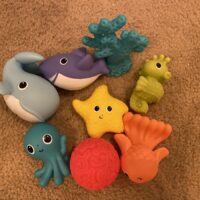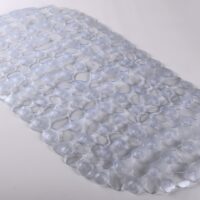When I was a new mom, everyone had free advice for me. My Russian-born neighbor told me not to drink too much water, and my midwife told me to drink several quarts daily. Family members offered parenting tips, and so did my friends, who were new parents themselves.
Being a new mom can be overwhelming. After the birth of your baby and throughout the first few weeks of his or her life, you may feel exhausted, since the hours you spend feeding and caring for your newborn add up to more than a full-time job. Even if you have taken parenting classes and scoured the internet for advice, the unique experience of motherhood is like no job you have had before. Any new mom needs practical, concise help (along with a few extra hours of solid sleep).
As a mom of eleven children, I have learned a thing or two along the way. If I could compile a bunch of helpful hints I wish had known, it would be the following list of baby care tips for new moms.
The Most Important Baby Care Tips
Relax and Enjoy Your Baby
This step may not seem very practical at first, but it might be the most important. Relax and enjoy that baby of yours, because sweet little newborns transform into sturdy toddlers in the blink of an eye. Learn about and anticipate baby milestones but don’t fret about them. You have the best job in the world right now, and it is temporary, fleeting, and precious
Talk To Your Baby
Your little one loves to hear your voice because your voice and your face are the dearest things she knows. Talking and reading to your infant is beneficial for many reasons:
- Talking to your baby helps the brain develop.
- Speaking aloud helps your baby learn new words. A variety of spoken words can add up to a bigger vocabulary and greater school success in the future.
- Chatting with your baby can help with mother-child bonding.
Get The Best Advice
Gather advice from experienced parents who have raised children and grandchildren. Although they lived through different trends across different generations, theirs is the time-tested guidance you need, so listen and learn.
It is common for young moms to share baby tips and announce what seems to be working for them. Although it is fun to compare joys and trials together with friends, gaining advice from other rookie parents is like pooling your ignorance together and choosing solutions from the lot.
Get your best counsel from a panel of experts that includes moms, grandmas, mothers-in-law, and experienced older moms whom you respect. After soaking up all of their wisdom, choose strategies that you feel will work best for you and your baby.
Lay Low
You have an ideal window of opportunity to take it easy with your baby. Everyone does (or should) expect you to be absent for a while from social events, meetings, and work pressures. Take advantage of this by laying low on purpose. Say no to absolutely everything you can.
When you need to get out of the house, ask someone to watch your infant between feedings and come back soon.
Limit Social Media
If you wish, take dozens of photos, keep a baby journal, and record what your baby does every day. But postpone the posting until after the first few weeks. Really. Just live, rest and savor your baby for a while. Above all, resist the temptation to look at social media to gauge your baby’s development, and shun any type of competition to be Supermom.
Feeding Your Baby
Bottle or Breastfeeding?
If you choose to breastfeed your baby, begin immediately after the birth. The yellow colostrum that your baby receives, even before your breast milk arrives, is loaded with beneficial nutrients and immune boosters.
I have bottle-fed some of my babies and breastfed others, due to having a premature baby and other unique issues. If I had my way and could do it all over again, I would choose the convenience of breastfeeding a baby who also happily took a bottle when I wanted her to.
Do your own research and make the decision that works best for your baby and your family.
If you decide to breastfeed your baby, it may go smoothly but some moms encounter difficulties along the way. Relax and do not worry. Thankfully, there are experienced moms who could help you, and there are professional lactation consultants that can help troubleshoot any breastfeeding issues. Ask for help.
On Demand or On Schedule?
If you are breastfeeding your baby, it is essential throughout the first few weeks to allow your baby to nurse whenever she wants to, or “on demand.” This will help develop a solid milk supply, because the more your baby eats, the more milk you will produce.
After this initial period, some moms transition to a flexible feeding schedule. Having a (loose) feeding schedule for your baby helps her develop an eating/sleeping/playing routine that often leads to an infant who sleeps through the night more quickly.
Create a Cozy Feeding Spot
It may be helpful to feed your baby in the same place every day. This should be a comfortable spot where you can snuggle up with your baby. Supply your space with comfortable pillows that can support your back and allow you to keep the baby in the right position for feeding. You might also want to keep a basket nearby with snacks, water bottle, pen, paper, and books handy. Don’t forget to throw in a few diapers, wipes, and hand sanitizer in case of emergencies.
Your Baby and Sleep
If your baby is not eating at the moment, chances are your baby is sleeping. You may have heard that a new mom should “nap when her baby naps.” This is sound advice, and it’s best to take that nap immediately when your baby falls asleep, or something will likely thwart your nap.
Baby’s Sleep Arrangement
Whatever the season, a baby’s sleeping area should hover between 68 and 72 degrees F, and at 72 F if your newborn is preterm.
The National Institute of Health and the American Academy of Pediatrics recommend that you place infants to sleep on their back. Use a firm, safety-approved crib and mattress and keep your sleeping baby close to you throughout the first six months. Your infant’s bed should be free of pillows and soft toys that might restrict his ability to breathe freely.
How Much Sleep Does Your Baby Need?
Baby sleep patterns fluctuate as they grow, and here are some general infant sleep guidelines:
- Birth to 3 months: Newborns often sleep 10-17 hours of the day. Their sleep is interrupted into short feeding periods, diaper changes and time with family. Breastfed infants often wake up to eat more frequently than bottle-fed infants.
- 3 to 6 months: A baby’s sleep stretches to a series of slightly longer naps and adds up to approximately 12-15 hours a day. Some babies at this age may start sleeping through the night.
- 6 to12 months: After six months, many babies sleep mostly during the night, with naps during the day.
Start a Sleep Routine
As a mom, you can introduce healthy sleep habits to your baby by encouraging a regular and predictable sleep schedule.
One way to ensure that babies sleep well at night is to make sure they get enough interaction, exercise, and stimulation throughout the day. When bedtime rolls around, start the calming activities that will lull baby into a sleepier mode. Try reading books, singing, massaging, or bathing your baby.
It feels nice to rock a baby to sleep and gently before bedtime, but if you make it a habit, she may always require that gentle rocking to go to sleep. An important step in a healthy sleep routine is teaching your infant to fall asleep on her own.
Changing Your Baby’s Diapers
Check your baby’s diapers every four hours, or more often if needed. After the first week of life, your baby will probably produce about 6-8 wet diapers a day. Keeping count of wet diapers can assure you that your breastfed baby is getting enough to eat and staying hydrated. If you are using cloth diapers, wash them in a gentle detergent and dry them without fabric softener.
Set Up a Diaper Station
If you have a diaper station set up and ready, you will have everything you need handy and ready to go. Your diaper station should include a changing pad, diapers in the proper size, along with wipes, washcloths, diaper rash cream, and a place to trash the dirty diaper.
If your home has more than one level, it might be helpful to leave a basket of diapers and wipes in more than one place.
Change and Wipe
Before you start, make sure everything is within reach. Your baby should never be left unattended, even if she cannot roll over yet.
Using the baby wipes, clean your baby from front to back. Never wipe from back to front, especially on infant girls, since this can lead to a serious urinary tract infection. It might help the cleaning process to gently lift your baby slightly by lifting both her ankles at once.
Baby boys can spray at any given moment, so it might help to shield yourself with a diaper over the penis until you are finished and the new diaper is securely fastened.
Avoid Diaper Rash
If diaper rash happens regularly, lasts more than three days, or is accompanied by pain or blisters, let your doctor know.
Here are some practices that may prevent diaper rash:
- Change baby’s diapers often and immediately after bowel movements. Clean the baby’s bottom gently, without irritating the skin.
- Use a gentle diaper cream to prevent or heal rashes
- If your baby has a rash, let her go diaperless for a few hours. Lay her down on a pad of cloth or a towel and allow her bottom to air out, which can help a rash heal faster.
Soothing A Fussy Baby
If your baby is fussy, start by ruling out obvious reasons. Is he wet? Tired? Hungry? Too hot? Too cold? Is there an annoying clothing tag scraping against his neck? It can be frustrating trying to figure out how to soothe an unhappy baby and you might find yourself getting angry.
Remember to never shake your baby in your frustration, since this can cause lifelong brain damage.
Keep talking gently to your baby, because if you are tense and upset, he will be too.
Try one of these ideas to calm a fussy baby:
- Bounce on an exercise ball with your baby
- Take your baby for a car ride
- Sing to your baby
- Swaddle your baby or wear her in a backpack
- Let your baby nurse or suck on a pacifier
- Take your baby for a stroller ride
- Place your baby in an infant swing
- Give your baby a soothing bath
- Massage your baby with a natural oil
Bathing Your Baby
Bathing your baby doesn’t need to happen every day, since this dries out an infant’s tender skin. Three times a week is adequate if you are thoroughly cleaning the face and diaper area consistently.
Prepare all your supplies ahead of time, check the water temperature first, and never leave your infant unattended for a moment. Using a bath mat can help keep your baby from slipping around during the bath. Get a secure hold on your infant as you ease her into the tub. Using a clean washcloth, wipe the face first, and make sure you clean all of those fat creases thoroughly. Clean gently behind the ears, around the neck, and around the genitals.
A good bath for an infant does not have to include fragrant soap and bubbles. In fact, many moms skip the soap or use a mild, unscented soap. You can also pass on the lotions since babies have supple skin, loaded with natural oils. Powder should also be avoided since it can cause respiratory problems in some babies. Just dry your baby gently and thoroughly with a soft towel.
Burping Your Baby
Why must you burp a baby during feeding? There are several reasons. Like all of us, babies can get trapped gas in the intestines and it needs to get out. Air can get in through the nipple while the baby is feeding and the air bubbles need to be released. Air and gas in your baby’s stomach cause discomfort, and burping is the way to get it out.
Burping Positions
There are different positions you can use when burping your baby, so choose one that is most effective:
- Lay your baby’s head down on your shoulder. While supporting his head and body, gently pat him on the back with your other hand.
- Position your baby down on your lap with its head down. Gently pat or rub her back until a burp is released.
- Sit your baby upright on your lap while completing supporting him and holding his chin. Use your other hand to gently bring up a burp by patting gently on his back.
Burping Tips
Burp your baby after each feeding. Some moms burp their babies in the middle of a feeding, and this can help sleepy babies wake up. If you keep trying and your baby still isn’t burping, try a new burping position.
When your baby burps, it is likely that she will bring up a little milk with the burp, so have a burp cloth ready! Burp cloths are often rather small, so it might help to have a small receiving blanket ready for spit-ups instead of those tiny little burp cloths.
Keep your baby in an upright position for 15 minutes or so after the feeding, and there may be less chance of additional spit-up.
Dressing Your Baby
The best baby accessory is a bib, which is your first line of defense for spit-ups.
The next essential accessory is a lightweight hat, which can protect your baby’s head from cool weather and shield it from the sun.
Beyond that, make your baby comfortable in natural fibers, and dress her as warmly as you are dressed. When the temperature reaches 75 degrees F, your baby should be comfortable in a single layer of clothing.
Quick snap pajamas and onesies will make changing your baby easier in the guaranteed event of an explosion.
For laundering baby clothes, some parents like to use mesh laundry bags as an easier way to wash baby clothes without losing those tiny socks.
Don’t Hesitate to Get Help
If you have a concern about your baby, consult your health practitioner. Reach out to your baby’s doctor for fever, vomiting or diarrhea, or anything else that appears to be a change in your baby’s health or habits.
Call your doctor as soon as possible if your baby displays any of the following:
- Is excessively sleepy, unresponsive, or irritable
- Shows straining or discomfort with bowel movements
- Exhibits a rash on his body
- Vomits (not simply spitting up)
- Has a swollen belly
- Has swelling or redness by her umbilical cord
- Passes watery or mucousy stools
- Refuses to feed, or shows any change in eating habits
- If the baby is two months or younger and has a fever of 100.4 degrees F
- If the baby is older than two months and has a fever of 102 degrees F
Remember Self-Care
Everyone talks about self-care, and nobody needs it more than a new mom. Taking care of yourself is an ideal way to get back to feeling normal. When you feel at your best, you can take the best care of your family.
If you think of self-care as selfish, think again.
If you have never purposefully examined ways to develop a self-care routine, now is the time. Carving out 20-30 minutes of time every day to rejuvenate yourself and boost your mood is an excellent habit to practice and one that will ultimately benefit the whole family.
Years ago I decided I needed a few uninterrupted hours to myself every week. Other routines have come and gone, but I will hold on to that habit gratefully and forever. Self-care is unique and different for each person, so consider what would work best for you. Here are several things that a new mom can do to take care of herself:
- Eat a balanced diet.
- Get out of the house and exercise in the fresh air, if possible.
- Keep a diary of your feelings and thoughts.
- Ask for and accept help from others.
- Give yourself permission to relax.
- Make an appointment with yourself and put it on the calendar. Then get out and do whatever you need to do to recharge your batteries
- Go for a quiet drive.
- Enjoy a massage.
- Do something creative.
The Baby Blues
If you are struggling with deep feelings of sadness, this is not uncommon, and it can happen to the best of us. Because of hormone fluctuations and other issues, a new mom may experience feelings of deep, unexplained sorrow — at a time when everyone thinks she should be incredibly happy. This situation may bring forth feelings of guilt and more sadness.
If you are struggling with the “Baby Blues” you are not alone. Discussing your feelings with a friend or health practitioner can make a big difference, and will be the best thing you can do for yourself and your baby.
If you have experienced any of the following for more than a week or two, seek help right away:
- Feeling constantly overwhelmed
- Crying continually
- Anxious or worried thoughts
- Thoughts of harming yourself or baby
- Sleeping too much
- Not being able to sleep
- Sluggish and disinterested in life
- Not eating
- Feeling guilty, worthless, or out of control
Wrapping it Up
Being a new mom has its challenges and rewards. Even though at first your baby may seem unpredictable, pretty soon you will have mastered all of your baby’s charms, quirks, and habits. You will be able to feed, diaper, and burp your baby like a pro, and you might be getting more sleep now.
Congratulate yourself and bask in your accomplishments, because when you feel that you have finally become an expert, you will be just in time for the toddler stage, where the learning starts all over again!







